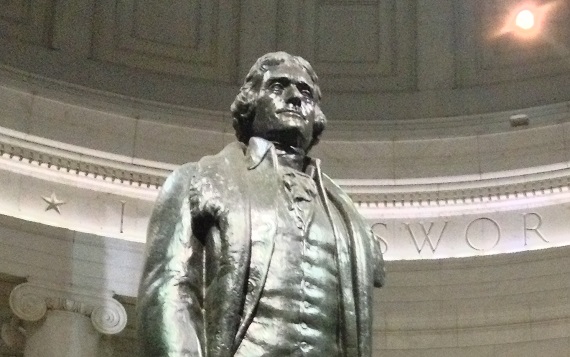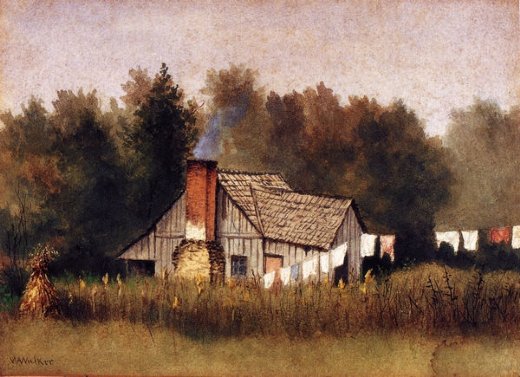
Editor’s Note: Often considered one of the more important “Lost Cause” post-bellum narratives, Letitia Burwell’s A Girl’s Life in Virginia Before the War offers a captivating glimpse of life in the Old South. Her grandfather had been Thomas Jefferson’s private secretary and her father served in the Virginia legislature ten times. Americans often marvel at the social mores and customs of old Europe–see the popularity of the PBS series Downton Abbey–but consider similar stories from the American South to be fabricated. This has more to do with preconceived prejudices than historical knowledge or understanding, for if the Burwell was telling the truth (why would she lie?) then modern interpretations of the South are the real “myth” of American history.
The extent of these estates precluding the possibility of near neighbors, their isolation would have been intolerable but for the custom of visiting which prevailed among us. Many houses were filled with visitors the greater part of the year, and these usually remained two or three weeks. Visiting tours were made in our private carriages, each family making at least one such tour a year. Nor was it necessary to announce these visits by message or letter, each house being considered always ready, and “entertaining company” being the occupation of the people. Sometimes two or three carriages might be descried in the evening coming up to the door through the Lombardy poplar avenue, – the usual approach to many old houses; whereupon ensued a lively flutter among small servants, who, becoming generally excited, speedily got them into their clean aprons, and ran to open gates and to remove parcels from carriages. Lady visitors were always accompanied by colored maids, although sure of finding a superfluity of these at each establishment. The mistress of the house always received her guests in the front porch, with a sincere and cordial greeting.
These visiting friends at my own home made an impression upon me that no time can efface. I almost see them now, those dear, gentle faces, my mother’s early friends, and those delightful old ladies, in close bordered tarlatan caps, who used to come to see my grandmother. These last would sit round the fire, knitting and talking over their early memories: how they remembered the red coats of the British; how they had seen the Richmond theater burn down, with some of their family burned in it; how they used to wear such beautiful turbans of crêpe lisse to the Cartersville balls, and how they used to dance the minuet. At mention of this my grandmother would lay off her spectacles, put aside her knitting, rise with dignity, – she was very tall, – and show us the step of the minuet, gliding slowly and majestically around the room. Then she would say: “Ah, children, you will never see anything as graceful as the minuet. Such jumping around as you see would not have been regarded as dignified in my day!”
My mother’s friends belonged to a later generation, and were types of women whom to have known I shall ever regard as a blessing and privilege. They combined intelligence with exquisite refinement; and their annual visits gave my mother the greatest happiness, which we soon learned to share and appreciate.
As I look upon these ladies as models for our sex through all time, I enumerate some of their charms:
Entire absence of pretense made them always attractive. Having no “parlor” or “company” manners to assume, they preserved at all times a gentle, natural, easy demeanor and conversation. They had not dipped into the sciences, attempted by some of our sex at the present day; but the study of Latin and French, with general reading in their mother tongue, rendered them intelligent companions for cultivated men. They also possessed the rare gift of reading well aloud, and wrote letters unsurpassed in penmanship and style.
Italian and German professors being rare in that day, their musical acquirements did not extend beyond the simplest piano accompaniments to old English and Scotch airs, which they sang in a sweet, natural voice, and which so enchanted the beaux of their time that the latter never afterward became reconciled to any higher order of music.
These model women also managed their household affairs admirably, and were uniformly kind to, but never familiar with, their servants. They kept ever before them the Bible as their constant guide and rule in life, and were surely, as nearly as possible, holy in thought, word, and deed. I have looked in vain for such women in other lands, but have failed to find them.
Then there were old gentlemen visitors, beaux of my grandmother’s day, still wearing queues, wide-ruffled bosoms, short breeches, and knee buckles. These pronounced the a very broad, sat a long time over their wine at dinner, and carried in their pockets gold or silver snuffboxes presented by some distinguished individual at some remote period.
Our visiting acquaintance extended from Botetourt County to Richmond, and among them were jolly old Virginia gentlemen and precise old Virginia gentlemen; eccentric old Virginia gentlemen and prosy old Virginia gentlemen; courtly old Virginia gentlemen and plain-mannered old Virginia gentlemen; charming old Virginia gentlemen and uninteresting old Virginia gentlemen. Many of them had graduated years and years ago at William and Mary College.
Then we had another set, of a later day, – those who graduated in the first graduating class at the University of Virginia when that institution was first established. These happened – all that we knew – to have belonged to the same class, and often amused us, without intending it, by reverting to that fact in these words:
“That was a remarkable class! Every man in that class made his mark in law, letters, or politics! Let me see: There was Toombs. There was Charles Mosby. There was Alexander Stuart. There was Burwell. There was R. M. T. Hunter,” – and so on, calling each by name except himself, knowing that the others never failed to do that!
Edgar Poe and Alexander Stephens of Georgia were also at the university with these gentlemen.
Although presenting an infinite variety of mind, manner, and temperament, all the gentlemen who visited us, young and old, possessed in common certain characteristics, one of which was a deference to ladies which made us feel that we had been put in the world especially to be waited upon by them. Their standard for woman was high. They seemed to regard her as some rare and costly statue set in a niche to be admired and never taken down.
Another peculiarity they had in common was a habit – which seemed irresistible – of tracing people back to the remotest generation, and appearing inconsolable if ever they failed to find out the pedigree of any given individual for at least four generations. This, however, was an innocent pastime, from which they seemed to derive much pleasure and satisfaction, and which should not be regarded, even in this advanced age, as a serious fault.
Among our various visitors was a kinsman – of whom I often heard, but whom I do not recollect – a bachelor of eighty years, always accompanied by his negro servant as old as himself. Both had the same name, Louis, pronounced like the French, and this aged pair had been so long together they could not exist apart. Black Louis rarely left his master’s side, assisting in the conversation if his master became perplexed or forgetful. When his master talked in the parlor, black Louis always planted his chair in the middle of the doorsill, every now and then correcting or reminding with: “Now, marster, dat warn’t Colonel Taylor’s horse dat won dat race dat day. You and me was dar.” Or: “Now, marster, you done forgot all ’bout dat. Dat was in de year 1779, an’ dis is de way it happened,” etc., much to the amusement of the company assembled. All this was said, I am told, most respectfully, although the old negro in a manner, possessed his master, having entire charge and command of him.
The negroes often felt great pride in “our white people,” as they called their owners, and loved to brag about what “our white people” did and what “our white people” had.
On one occasion it became necessary for my sister and myself to ride a short distance in a public conveyance. A small colored boy, who helped in our dining room, had to get in the same stage. Two old gentlemen, strangers to us, sitting opposite, supposing we had fallen asleep when we closed our eyes to keep out the dust, commenced talking about us. Said one to the other: “Now, those children will spoil their Sunday bonnets.” Whereupon our colored boy spoke up quickly: “Umph! you think dem’s my mistesses’ Sunday bonnets? Umph! you jes’ ought to see what dey got up dar on top de stage in dar bandbox!” At this we both laughed, for the boy had never seen our “Sunday bonnets,” nor did he know that we possessed any.






